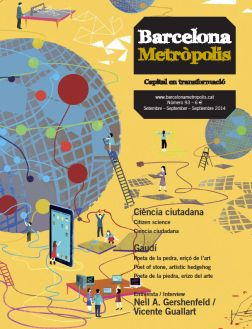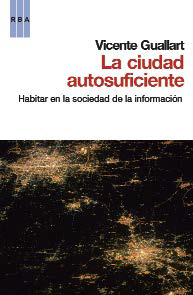Author: Vicente Guallart
Actar Publishers
New York, 2014
262 pages
We have had to swallow arguments on Barcelona that are so convoluted that still today, forty years after Franco’s death, I am surprised to read a book that speaks passionately about the city’s future without insulting my intelligence. It is common knowledge that since the 17th century – with the exception of a fifty year period before the Spanish Civil War – Barcelona has been pushed aside to make way for Madrid, forsaking its history, culture and ambitions to be a leading light in the Mediterranean.
The Self-Sufficient City is a treatise written in a style well-versed in marketing, and with a hint of shareholder interest that at times evokes memories of the times of socialist cosmopolitan splendour. The book is full of ideas though, and statements that might be considered grandiose or vague are relegated to the background. While Vicente Guallart does not give centre stage to the geopolitical issues that are decisive in the development of every major city, neither does he avoid them. This allows him to use Barcelona as the focal point of a slightly speculative, but very solid and cosmopolitan discussion.
According to Guallart, globalisation will force humanity to surpass the current model of the modern metropolis. The book insists that if we continue to build cities following past blueprints, a global collapse awaits since humanity will not have the necessary resources to complete the urbanisation process in which it is immersed. Guallart believes that just as technology has traditionally distanced urban life from nature, it should now extend the proverbial olive branch through more efficient methods of production and consumption.
The book reminds us that the cities of today are still products of the hopes mankind pinned on machinery in centuries past. Proof of this is found in the cities that spring up like mushrooms across Asia. As soon as the works finish, many such cities already appear old because they cling to political and economic models that are obsolete, having been surpassed by technology and 20th century experience. Look carefully – says Guallart – and you will see that many Asian cities have neighbourhoods reminiscent of those built in Europe after World War II, uniform and lacking in identity, but with buildings more than thirty storeys high.
Guallart says that it is the job of Western capitals to correct this trend. The artificial consumer city, separated from nature by an inhumane cultural and economic wall, should evolve to a city model that is more organic and ecological, and also more democratic. The author asserts that if technology is revolutionising our ways of living and working, sooner or later it will also revolutionise the organisation of our cities. Guallart is deeply understanding of the relationship between productive culture, urban culture and political culture, and it is via this relationship that he endeavours to propose a future in which cities have an almost redemptive role for humanity.
Without saying it in so many words – the tone of the book differs – Guallart seems convinced that globalisation will empower the civil ideas etched into Barcelona’s history. In the urban planning of the city’s Chief Architect, there are resonances of a certain Gaudí-like naturalism. When he says that the challenge for cities in the 21st century is becoming productive again, it seems to me that he is saying that cities must be rethought to recapture some of the mediaeval urban traditions cast aside by the French Revolution, the Industrial Revolution, and, of course, by the invasion of Barcelona in 1714.




Me being a student of Landscape Architecture, am very interested over the organic city model. I am very grateful if I can get a copy of this book. Thank you.
Dear Erandee,
You can find the book in any specialised library or in online sites that sell books of this kind.
Barcelona Metròpolis